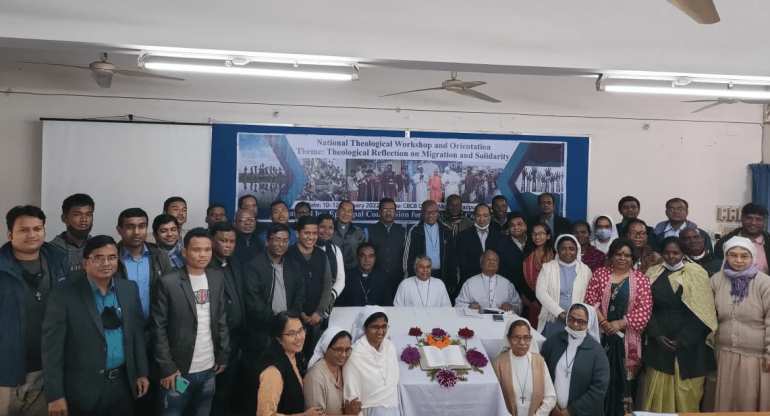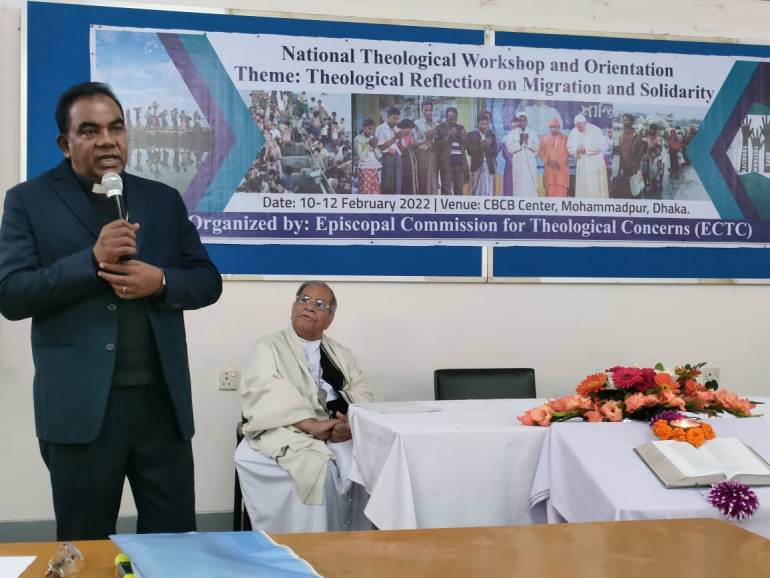Bangladesh Church invites laity to welcome, integrate migrants

Bangladesh Catholic church brought together laity to look at migration and solidarity with the eyes of faith, based on the Bible.
Bangladesh’s Episcopal Commission for Theological Concerns (ECTC), formed in 2018, organized a theological workshop at the Catholic Bishop’s Conference of Bangladesh (CBCB) Centre, Mohammadpur in Dhaka on February 10-12, 2022.
The theme of this theological workshop was "Theological Reflection on Migration and Solidarity."
The purpose of the workshop is to develop theological thinking, deepen the theological knowledge of the participants and the laity, and develop local theology contextualize theology.
The theme was chosen in the context when Migration is a contemporary burning issue, a talk of the day, and when Pope Francis frequently invites the Church and the world to welcome, protect, promote, and integrate the migrants.
Diocese of Rajshahi Bishop Gervas Rozario said, "Theological seminar was a fruitful venture of the ECTC. For the first time, the participants have learned the method of theologizing" based on contextual issues.
"They have committed themselves to look at things with the eyes of faith, inspired by the Gospel of Jesus Christ," said Bishop Rozario.
The prelate said that migration is not only a challenge, but rather it is an opportunity. It is not the problem but rather the symptom that lies in the country of origin and in the country of destination where special attention is needed.
Father Emmanuel K. Rozario, the Executive Secretary of ECTC, told RVA News about the program.
"The program was effective as it enhanced the theological thinking of the participants. Migration does not happen suddenly; it was in the very blessing of God after creation,” he said, quoting Genesis 1:28.
"From the historical perspective, migration is the very nature and essence of the Church. The Bible speaks the fact that God is always in favor of the migrants, and He instructed to safeguard their dignity, value, and right as human beings," said Father Emmanuel Rozario.
"This is our moral obligation. Theologically speaking, from the creation perspective, God is the first migrant; without migration, God would not be in the world; from the Incarnation perspective, without the migration of the Word of God made flesh Christ would not be one of us. Without the mission of the Holy Spirit, the migrants would not get the power and courage to move for a better place," Father Rozario says.
Father Emmanuel Rozario said that the migrants are not simply the image of God, but rather the image of the Migrant God, and by welcoming the migrants, one welcomes God who is present in them. So the migration perspective inspires us to rethink our beliefs and to theologize accordingly."
Archbishop Bejoy N. D'Cruze, OMI, the archbishop of Dhaka, and the Chairman of the Commission offered inputs on the introduction to Christian theology.
Bishop Gervas Rozario of Rajshahi Diocese introduces the methodology of Doing Theology and Moral Response to the phenomenon of Migration.
Jyoti Gomes, the Regional Director of Caritas Dhaka Region, surmised the overall situation and context of migration regarding Bangladesh.
Cardinal Patrick D'Rozario and Father Emmanuel K. Rozario, the Executive Secretary of (ECTC), spoke about Asian Theology, Biblical and Theological Response to Migration and Solidarity. Two migrant speakers gave life testimony.
A total of 52 participants attended the Theological workshop from dioceses across Bangladesh. Due to the Covid-19 pandemic, the number of participants was limited.

Radio Veritas Asia (RVA), a media platform of the Catholic Church, aims to share Christ. RVA started in 1969 as a continental Catholic radio station to serve Asian countries in their respective local language, thus earning the tag “the Voice of Asian Christianity.” Responding to the emerging context, RVA embraced media platforms to connect with the global Asian audience via its 21 language websites and various social media platforms.














